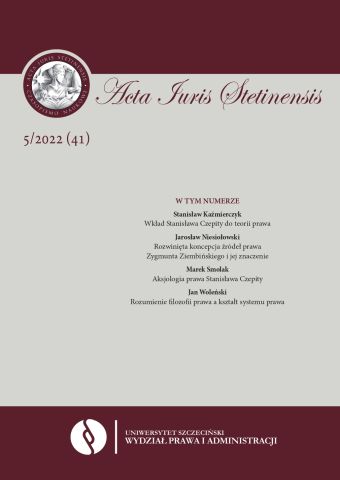







| Authors: |
Małgorzata
Stefaniuk

Uniwersytet Marii Curie-Skłodowskiej w Lublinie |
| Keywords: | vacatio legis parliamentary practice entry into force interest of the state ad hoc political objectives |
| Data publikacji całości: | 2022 |
| Page range: | 21 (101-121) |
| Downloads ?: | 64 |
| 1. | Czerniak A., Ustawa o rajach podatkowych, czyli jak nie tworzyć prawa, www.polityka.pl/tygodnikpolityka/rynek/1595037,1,ustawa-o-rajach-podatkowych-czyli-jak-nietworzyc-prawa.read. |
| 2. | Drobnik J.B., Zasada odpowiedniego vacatio legis jako forma ochrony praw i wolności konstytucyjnych w kontekście restrykcji covidowych, „Pro Fide Rege et Lege” 2021, nr 85. |
| 3. | Garlicki L., Materialna interpretacja klauzuli demokratycznego państwa prawnegow orzecznictwie Trybunału Konstytucyjnego, w: J. Kowalski (red.), Państwo prawa. Demokratyczne państwo prawne. Antologia, Warszawa 2008. |
| 4. | Kasprzyk A., Instytucja vacatio legis – pojęcie i znaczenie dla polskiego prawodawstwa, w: A. Dębiński i in. (red.), Abiit, non obiit. Księga poświęcona pamięci Księdza Profesora Antoniego Kościa SVD, Lublin 2013. |
| 5. | Kasprzyk A., Vacatio Legis Institution – Sense and Meaning, „Teka Komisji Prawniczej – OL PAN” 2016. |
| 6. | Lipowicz I., Uwagi o polskim systemie stanowienia prawa, „Państwo i Prawo” 2012, z. 7. |
| 7. | Morawska E., Klauzula państwa prawnego w Konstytucji RP w Konstytucji RP na tle orzecznictwa Trybunału Konstytucyjnego, Toruń 2003. |
| 8. | Oniszczuk J., Prawo do dobrej demokracji i zasada zaufania jednostki do państwa, w: E. Gdulewicz, H. Zięba-Załucka (red.), Dziesięć lat Konstytucji Rzeczypospolitej Polskiej, Rzeszów 2007. |
| 9. | Stefaniuk M.E., Zasada odpowiedniego vacatio legis jako element zasady zaufania do państwa i stanowionego przez nie prawa, „Studia Iuridica Lublinensia” 2016, vol. XXV, nr 1. |
| 10. | Stefaniuk M.E., Zasada odpowiedniego vacatio legis w praktyce parlamentarnej Sejmu Rzeczypospolitej Polskiej VII i VIII kadencji, Lublin 2020. |
| 11. | Stefaniuk M.E., „Ważny interes (publiczny, społeczny, państwa)”, jako warunek odstępstwa od zasady zachowania odpowiedniej vacatio legis, w: M. Aleksandrowicz, |
| 12. | A. Jamróz, L. Jamróz (red.), Demokratyczne państwo prawa, Białystok 2014. |
| 13. | Witkowski Z., Wprowadzenie do dyskusji, w: K. Bramowski i in. (red.) Zielona Księga – System stanowienia prawa w Polsce, Warszawa 2013, www.inpris.pl/fileadmin/user_upload/documents/Biblioteka_PL/system_stanowienia_prawa_zielonaksiega.pdf. |
| 14. | Wronkowska S., O stanowieniu i ogłaszaniu prawa oraz o kulturze prawnej, „Państwo i Prawo” 2007, nr 7. |
| 15. | Wronkowska S., Ustawa o ogłaszaniu aktów normatywnych i niektórych innych aktów prawnych, „Przegląd Sejmowy” 2001, nr 5. |
| 16. | Zalasiński T., Zasada prawidłowej legislacji w poglądach Trybunału Konstytucyjnego, Warszawa 2008. |